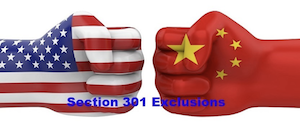By: Brandon French, Associate Attorney
The United States Trade Representative (USTR) recently released a list of Section 301 exclusions that would be extended through May 31, 2025.[1] Within the Notice, the USTR explained that extending these exclusions will support efforts to shift sourcing out of China, or provide additional time where, despite efforts to source products from alternative sources, availability of the product outside of China remains limited. A list of exclusions that were extended until May 31, 2025, are listed in Annex C within the Notice.
On the other hand, the USTR determined that certain Section 301 exclusions should not be extended. While these Section 301 exclusions are technically extended until June 14, 2024, they will soon expire, and importers who previously utilized the Section 301 exclusions will begin paying tariffs. A list of Section 301 exclusions that will expire June 14, 2024, are listed in Annex D within the Notice. The USTR provided detailed reasoning in the Notice as to why certain exclusions were not extended for an additional year. For instance, the USTR:
- Declined to further extend exclusions where comments indicated that importers had no plans to shift sourcing out of China in 2024 (or at all).
- Declined to further extend exclusions where, despite more than four years of temporary exclusion, commenters reported that they had taken few or no steps to shift sourcing out of China. This includes comments that, without further explanation, asserted that they were considering alternative sources, or reported plans to shift sourcing, but failed to adequately explain efforts undertaken or why additional time was needed.
- Declined to further extend exclusions where opposing comments indicated availability from domestic sources or third country sources. This includes opposing comments from domestic producers reporting available capacity and opposing comments from importers who previously benefitted from the exclusion reporting successful efforts to shift to alternative sources. Extending these exclusions may undercut those efforts, including recent investments in domestic capacity.
- Declined to extend exclusions where claims of unavailability were based on the product being unavailable at the price of Chinese sources. In many instances, comments simply asserted that products were unavailable because China remained the lowest cost source. Extending those exclusions would likely delay the commenters’ efforts to find alternative sourcing and continue their dependence on Chinese suppliers and products, which undermines the goal of obtaining the elimination of China’s acts, policies, and practices covered in the investigation.
- Declined to extend certain exclusions where commentors asserted that a product was unavailable outside of China due to costs associated with finding alternative sources or based on the limited availability of certain product specifications or comparable quality outside of China. Without additional explanation of efforts undertaken or how further extending the exclusion would aid efforts to shift sourcing.
As with all Section 301 exclusions, the extensions announced in the Notice are available for any product that meets the description in the product exclusion language. Further, the scope of each exclusion and modification is governed by the scope of the ten-digit Harmonized Tariff Schedule of the United States (HTSUS) subheadings and product descriptions in the Annexes of the Notice. U.S. Customs and Border Protection intends to issue instructions on entry guidance and implementation at a later date.
Based on certain exclusions being extended and certain exclusions expiring, companies should closely review whether they will need to begin paying the Section 301 tariffs starting June 14th. If an exclusion was extended, importers should notify their brokers so that the proper secondary HTS code can be used to take advantage of the exclusion. If an exclusion expired, importers should consider whether alternative sourcing is a viable option in the future to help mitigate the Section 301 tariffs, among other possibilities.
For any additional inquiries, or if you would like to discuss whether your products qualify for a Section 301 exclusion, please contact Brandon French at [email protected].
[1] https://ustr.gov/sites/default/files/Section%20301%20Exclusion%20Extension%20FRN_0.pdf.
Read more articles by these authors:

